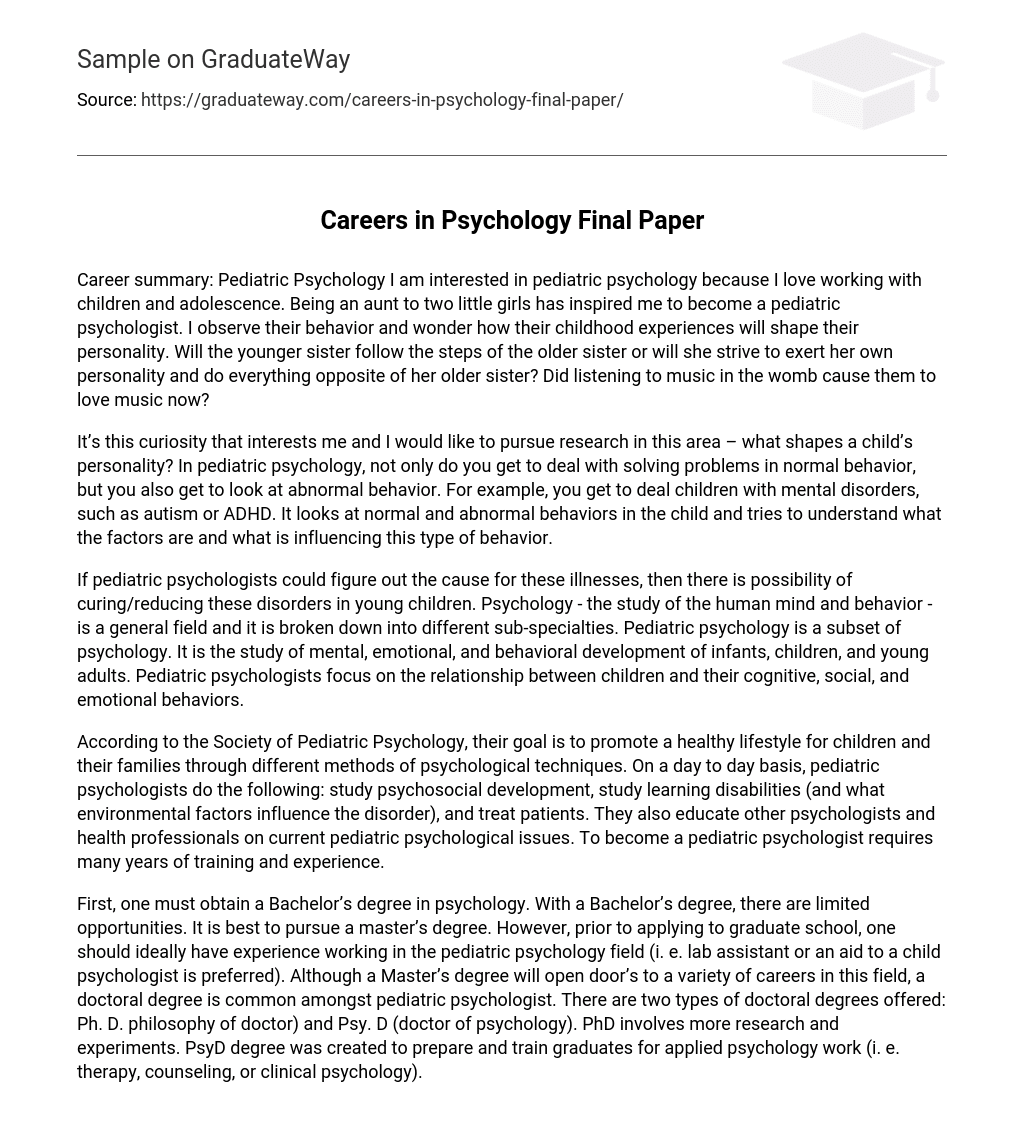Career summary: Pediatric Psychology I am interested in pediatric psychology because I love working with children and adolescence. Being an aunt to two little girls has inspired me to become a pediatric psychologist. I observe their behavior and wonder how their childhood experiences will shape their personality. Will the younger sister follow the steps of the older sister or will she strive to exert her own personality and do everything opposite of her older sister? Did listening to music in the womb cause them to love music now?
It’s this curiosity that interests me and I would like to pursue research in this area – what shapes a child’s personality? In pediatric psychology, not only do you get to deal with solving problems in normal behavior, but you also get to look at abnormal behavior. For example, you get to deal children with mental disorders, such as autism or ADHD. It looks at normal and abnormal behaviors in the child and tries to understand what the factors are and what is influencing this type of behavior.
If pediatric psychologists could figure out the cause for these illnesses, then there is possibility of curing/reducing these disorders in young children. Psychology – the study of the human mind and behavior – is a general field and it is broken down into different sub-specialties. Pediatric psychology is a subset of psychology. It is the study of mental, emotional, and behavioral development of infants, children, and young adults. Pediatric psychologists focus on the relationship between children and their cognitive, social, and emotional behaviors.
According to the Society of Pediatric Psychology, their goal is to promote a healthy lifestyle for children and their families through different methods of psychological techniques. On a day to day basis, pediatric psychologists do the following: study psychosocial development, study learning disabilities (and what environmental factors influence the disorder), and treat patients. They also educate other psychologists and health professionals on current pediatric psychological issues. To become a pediatric psychologist requires many years of training and experience.
First, one must obtain a Bachelor’s degree in psychology. With a Bachelor’s degree, there are limited opportunities. It is best to pursue a master’s degree. However, prior to applying to graduate school, one should ideally have experience working in the pediatric psychology field (i. e. lab assistant or an aid to a child psychologist is preferred). Although a Master’s degree will open door’s to a variety of careers in this field, a doctoral degree is common amongst pediatric psychologist. There are two types of doctoral degrees offered: Ph. D. philosophy of doctor) and Psy. D (doctor of psychology). PhD involves more research and experiments. PsyD degree was created to prepare and train graduates for applied psychology work (i. e. therapy, counseling, or clinical psychology). After earning a doctoral degree and before getting job, a pediatric psychologist must do a clinical internship for at least two years. In addition to that, one can do a postdoctoral fellowship program. Some chose not to do the optional program and will rather work in schools, hospitals, clinics, or private practice.
Once schooling is finished, one must be licenses to practice pediatric psychology. The licensing procedure varies in each state and one should find out the proper methods for obtaining a license (as required by that state). After completing all the above steps, one can practice as a pediatric psychologist. According to the Onet site of 2011, the average salary for pediatric psychologist ranges from $35,000-$100,000. The more education/experience one obtains the higher one’s salary. Also, the employment rate in this field is expected to increase by 10-20% over the next ten years.
This is a growing field and I’m excited to be taking the first steps to becoming a pediatric psychologist. References 19-3031. 00- Clinical, Counseling, and School Psychologists. (n. d. ). O*NET OnLine. Retrieved from http://www. onetonline. org/link/summary/19-3031. 00 Behavioral Health, Autism, Psychiatry, Psychology: Nationwide Children’s Hospital. (n. d. ). Nationwide Children’s Hospital: Leading Pediatric Hospital in Neonatal Medicine, Neurosciences, Gastroenterology, Heart Care, and much more. Retrieved from http://www. Nationwidechildrens. org/behavioral-health Pathways Through Medicine: Pediatric Psychology. n. d. ). The Next Generation: Tomorrow’s Medical Future Today. Retrieved from http://www. nextgenmd. org/archives/808 Pediatric Psychology/Clinical/Evaluative Programs/ Mailman Center For Child Development at Miller School of Medicine. (n. d. ). Department of Pediatrics at Miller School of Medicine. Retrieved from http://pediatrics. med. miami. edu/mailman-center/clinical-services/pediatric psychology. Society of Pediatric Psychology (Division 54). (n. d. ). American Psychological Association (APA). Retrieved from http://www. apa. org/about/division/div54. aspx





